Stephen Hawking urges inquiry into Jeremy Hunt's NHS 'weekend effect' claims
Professor joins scientists and doctors in saying evidence is shaky and 'cherry-picked'








Professor Stephen Hawking says Health Secretary Jeremy Hunt has "obstructed fact and misled parliament and the public" by making claims about weekend working in the NHS, a focal point of the junior doctors' strikes.
Hawking signed an open letter to The Guardian calling on Prime Minister Theresa May to start an inquiry into Hunt's claim that 11,000 patients die each year because there are fewer medics on duty at the weekends.
The letter says Hunt deliberately ignored evidence showing his claims are not true and misrepresented the facts to make his case. Other signatories include Lord Robert Winston, as well as various respected scientists, senior doctors and members of the House of Lords.
Subscribe to The Week
Escape your echo chamber. Get the facts behind the news, plus analysis from multiple perspectives.

Sign up for The Week's Free Newsletters
From our morning news briefing to a weekly Good News Newsletter, get the best of The Week delivered directly to your inbox.
From our morning news briefing to a weekly Good News Newsletter, get the best of The Week delivered directly to your inbox.
They claim that Hunt has "cherry-picked research", causing a "devastating breakdown of trust between government and the medical profession". He has made his claims "without faithfully representing the evidence", they add.
Hunt says that "eight independent studies" back up his claim of a "weekend effect", where patients suffer poorer care at the weekends because fewer doctors and other medics are working.
But the letter points out that he has ignored "at least 13 independent, peer-reviewed papers" that refute his claims.
It says that only four of Hunt's eight studies were independently peer-reviewed. Of these, three are based on data from the same population, with only two of them working with data from within the last decade.
The other four so-called studies are in fact just "opinion pieces, the lowest form of clinical evidence", it says.
The letter is a "significant challenge to Hunt's integrity", says The Guardian, and has been rejected by the Department of Health.
A spokesman said: "Over the past six years we have been presented with clear independent evidence of variation in care across the weekend. This government makes no apology for tackling the issue, to build a safer seven-day NHS for patients.
"Further peer-reviewed evidence is emerging all the time, including the authoritative 2015 Freemantle report, which confirmed previous evidence of a weekend effect."
The Guardian spoke to Professor Julian Bion, an expert on the "weekend effect". He did not dispute the effect was real but said the causes are various and it is not simply due to understaffing on Saturdays and Sundays.
Stephen Hawking: Even I can't explain Donald Trump's popularity
31 May
Professor Stephen Hawking may have solved some of the most complex problems in the universe, but one thing is beyond even his understanding.
Asked by ITV's Good Morning Britain if he could explain the popularity of US Republican presidential candidate Donald Trump, the British physicist admitted: "I can't."
Trump defied all expectations by emerging as his party's presumptive nominee for the White House and his popularity among US voters continues to soar. But Hawking dismissed the billionaire businessman as "a demagogue who seems to appeal to the lowest common denominator".
During the interview, the Cambridge scientist also warned about the dangers of Brexit, predicting that Britain would become "culturally isolated and insular" if voters choose to leave the EU in next month's referendum.
"There are two obvious reasons why we should stay in," he said. "The first is that it promotes the mobility of people. Students can come here from EU countries to study and our students can go to other EU universities.
"The other reason is financial. The European Research Council has given large grants to UK institutions, either to foster or promote exchanges."
Hawking was also asked if his female fan base had been boosted by Eddie Redmayne's portrayal of him in the film The Theory Of Everything. "I had many fans before Redmayne played me," he replied.
Stephen Hawking's black hole theory given boost in lab
25 April
One of Professor Stephen Hawking's most controversial theories has been supported by an experiment conducted on a "black hole" developed in a laboratory.
In 1974, the physicist posited a bold theory for a phenomenon known as Hawking radiation, in which tiny portions of energy from black holes are captured and whisked away by particles.
With their energy gradually being siphoned off, the black holes would "slowly evaporate over time, vomiting out all the dust, light and passing stars they had swallowed in a trickle of heat", says The Times.
The idea contradicts conventional wisdom that nothing can escape a black hole and scientists have struggled to find evidence for the phenomenon, as it would take place so subtly that spotting it amid the vast expanse of space is almost impossible.
However, Professor Jeff Steinhauer, from the Technion institute in Israel, has developed a way to test the theory by creating a black hole made of sound in his laboratory and discovered that photons did indeed leak from the edges.
The findings, if confirmed, have far-reaching implications for our understanding of the universe, the nature of time and the connection between the past, the future and potential alternate universes.
"If determinism, the predictability of the universe, breaks down with black holes, it could break down in other situations," Hawking said while delivering The Reith Lecture in London this year. "Even worse, if determinism breaks down, we can't be sure of our past history, either. The history books and our memories could just be illusions."
Despite his high-profile status as one of the world's best-known scientists, Hawking has never been a recipient of the Nobel prize for physics, but he told the Reith audience that "Hawking radiation" could be the discovery which finally sees him join the ranks of elite scientists.
Stephen Hawking backs plan for 'nanocrafts' to distant stars
13 April
Professor Stephen Hawking has joined forces with billionaire Yuri Milner for a project that plans to send a probe to a neighbouring solar system in as little as 20 years.
The £70m project, called Breakthrough Starshot, will investigate the technologies required to send tiny spacecraft into space, travelling trillions of miles at one-fifth of the speed of light.
"Imagine hundreds of spacecraft the size of a butterfly, propelled by light beams at record-shattering speeds and journeying to distant stars 4.37 light years away," says CNN. That's "far deeper into space than human-built probes have ever ventured".
The BBC adds: "The concept is to reduce the size of the spacecraft to about the size of a chip used in electronic devices." Up to 1,000 of these "nanocrafts" would be launched towards the Alpha Centauri star system, a distance of 25 trillion miles. With current technology, such a journey would take around 30,000 years – but Breakthrough Starshot researchers believe their light-powered ships could reach it within a generation.
Each nanocraft would be equipped with a solar sail, which would receive a boost into space from a 100 billion-watt laser-powered light beam based on Earth. The probes would reach speeds of 37,000 miles per second.
The project will be led by Dr Pete Worden, a former director of Nasa's Ames Research Centre in California, with around £70m funding provided by Milner.
The Russian founder of the Breakthrough Prizes for science hopes to further research into the existence of extra-terrestrial life. However, for Hawking, Breakthrough Starshot also represents a crucial step forward for the preservation of life on Earth.
"If we are to survive as a species we must ultimately spread out to the stars," Hawking told the BBC. "It is unwise to keep all our eggs in one fragile basket. Life on Earth faces dangers from astronomical events like asteroids or supernovas."
Stephen Hawking: 'scientific progress is biggest danger to humans'
19 January
Humans are facing one of the most dangerous centuries yet as progress in science and technology becomes an ever greater threat to our existence, warns Professor Stephen Hawking.
Speaking ahead of his speech at this year's BBC Reith Lectures, Prof Hawking said the threat of a disaster on Earth would become "a near certainty", citing nuclear war, global warming and genetically engineered viruses as possibilities.
"Although the chance of a disaster to planet Earth in a given year may be quite low, it adds up over time and becomes a near certainty in the next thousand or ten thousand years," he said, in answer to an audience question.
Colonising space was a necessity given the increasingly high chance of a disaster on planet Earth, added the physicist.
"By that time, we should have spread out into space and to other stars, so a disaster on Earth would not mean the end of the human race.
"However, we will not establish self-sustaining colonies in space for at least the next hundred years, so we have to be very careful in this period."
Despite his warnings, which were described by the BBC as "ironic" given he is such a prominent figure in science, the physicist said he remained optimistic about the future.
"We are not going to stop making progress or reverse it, so we have to recognise the dangers and control them. I'm an optimist and I believe we can."
In a couple of more light-hearted answers, Prof Hawking said he would most like to go back in time and meet the 16th century astronomer Galileo Galilei and also scolded one audience member for calling him an introvert. "Just because I spend a lot of time thinking doesn't mean I don't like parties and getting into trouble," he said.
Prof Hawking was forced to postpone the original recording of the Reith Lecture in November, due to poor health, notes The Guardian. Instead, on 7 January, a day before his 74th birthday, he delivered the talk on black holes and the fate of information that falls inside them to a 400-strong audience at the Royal Institution in Mayfair, London.
The Reith Lecture will be broadcast in two parts on BBC Radio 4 at 9am on 26 January and 2 February.
Stephen Hawking pulls out of Reith Lectures due to ill health
11 November
Professor Stephen Hawking has pulled out of BBC Radio 4's prestigious Reith Lectures due to ill health.
The physics professor, who is 73, was supposed to record the lectures this Thursday, which were then due to be broadcast from 24 November.
A spokesperson from Cambridge University, where Hawking is director of research in the Department of Applied Mathematics and Theoretical Physics, has confirmed that "Professor Hawking is not very well and a few public appearances have had to be cancelled".
The BBC also stated that it is "postponing the broadcast of the lectures on Radio 4" and is "liaising with Professor Hawking and his team about the next steps once he is better".
The Reith Lectures are part of the BBC's flagship annual lecture series, and were inaugurated in 1948 by philosopher Bertrand Russell. Since then, names such as Robert Oppenheimer, Niall Ferguson and Daniel Barenboim have been invited to lecture.
This year, the lectures were due to be part of a series of events hosted by the BBC to mark the 100th anniversary of Albert Einstein's general theory of relativity.
When Hawking was announced as the next lecturer in June, he said he was "delighted" and looking forward to conveying the thrill of science to millions of listeners around the world, reports The Guardian.
Hawking is believed to be the longest-living survivor of motor neurone disease, which affects muscle movement without preventing brain activity. He was diagnosed at 21, while a student at Oxford University.
Stephen Hawking book reveals 'anguish' of his two marriages
16 October
Stephen Hawking has described the anguish triggered by the collapse of his first marriage and the "bitter acrimony" of his second.
The Cambridge cosmologist, who The Independent calls "the most famous scientist in the world", opened up about his marital life in an autobiography called My Brief History. It details the "personal trauma" of his life with his first wife, Jane Wilde, and his "passionate and tempestuous" relationship with his nurse and second spouse, Elaine Mason.
Hawking met Wilde when they were both students at Oxford University. He says she lifted him out of a deep depression when he was first diagnosed with motor neurone disease, providing hope of a future life and family.
But Wilde also succumbed to depression after the birth of their third child in 1979, finding it "difficult to cope with the demands of a young family and a husband confined to a wheelchair," The Independent reports. Seeking someone who would marry her and look after her children after Hawking died, she met a musician called Jonathan Jones and "installed" him in a room in the apartment she shared with Hawking.
"I would have objected, but I too was expecting an early death and felt I needed someone to support the children when I was gone," writes Hawking in My Brief History.
The situation gradually deteriorated. "In the end I could stand the situation no longer, and in 1990 I moved out to a flat with one of my nurses, Elaine Mason," writes Hawking.
He describes his relationship with Mason – whom he married in 1995 and divorced 12 years later – as "passionate and tempestuous". In 2004, the Daily Mail reported that police had questioned Hawking about claims that his second wife was abusing him. One of his nurses alleged that Elaine Hawking called her husband a cripple, bathed him in water that was too hot and allowed him to wet himself.
At the time, Hawking described the allegations as "completely false", a position he reiterates in My Brief History. He admits that he and Elaine had their "ups and downs", but says her medical training "saved my life" on more than one occasion.
In his book, Hawking reveals how he bought the last three speech synthesisers made by the Californian company Speech Plus when it went bust. He snapped up the devices as back-ups because "I identify with the voice and it has become my trademark".
Create an account with the same email registered to your subscription to unlock access.
Sign up for Today's Best Articles in your inbox
A free daily email with the biggest news stories of the day – and the best features from TheWeek.com
-
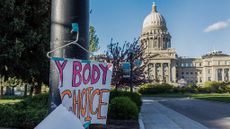 'Horror stories of women having to carry nonviable fetuses'
'Horror stories of women having to carry nonviable fetuses'Instant Opinion Opinion, comment and editorials of the day
By Harold Maass, The Week US Published
-
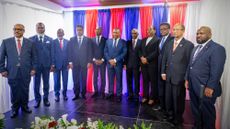 Haiti interim council, prime minister sworn in
Haiti interim council, prime minister sworn inSpeed Read Prime Minister Ariel Henry resigns amid surging gang violence
By Peter Weber, The Week US Published
-
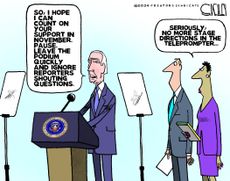 Today's political cartoons - April 26, 2024
Today's political cartoons - April 26, 2024Cartoons Friday's cartoons - teleprompter troubles, presidential immunity, and more
By The Week US Published
-
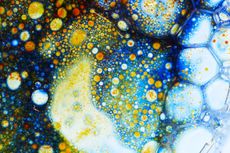 14 recent scientific breakthroughs
14 recent scientific breakthroughsIn Depth From photos of the infant universe to an energy advancement that could save the planet
By Devika Rao, The Week US Published
-
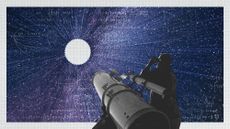 The hunt for Planet Nine
The hunt for Planet NineUnder The Radar Researchers seeking the elusive Earth-like planet beyond Neptune are narrowing down their search
By Chas Newkey-Burden, The Week UK Published
-
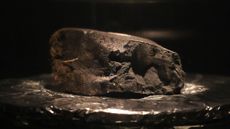 Winchcombe meteorite: space rock may reveal how water came to Earth
Winchcombe meteorite: space rock may reveal how water came to EarthThe Explainer New analysis of its violent journey confirms scientific theories on the origin of our planet's H2O
By Sorcha Bradley, The Week UK Published
-
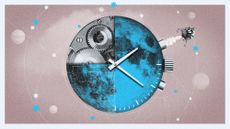 Why the Moon is getting a new time zone
Why the Moon is getting a new time zoneThe Explainer The creation of 'coordinated lunar time' is part of Nasa's mission to establish a long-term presence on Earth's only natural satellite
By Richard Windsor, The Week UK Published
-
 We're in the golden age of space exploration
We're in the golden age of space explorationIn depth To infinity and beyond!
By Devika Rao, The Week US Published
-
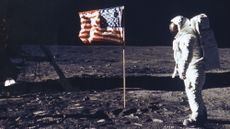 All the major moon landings so far
All the major moon landings so farThe Explainer One giant leap for mankind
By Devika Rao, The Week US Published
-
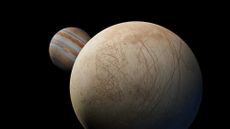 Jupiter's Europa has less oxygen than hoped
Jupiter's Europa has less oxygen than hopedspeed read Scientists say this makes it less likely that Jupiter's moon harbors life
By Peter Weber, The Week US Published
-
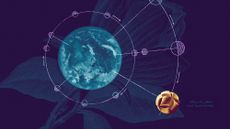 'Magnolias in space': why scientists have created the world's first wooden satellite
'Magnolias in space': why scientists have created the world's first wooden satelliteUnder The Radar New Japanese probe could help tackle 'graveyard of space junk' encircling Earth
By Chas Newkey-Burden, The Week UK Published